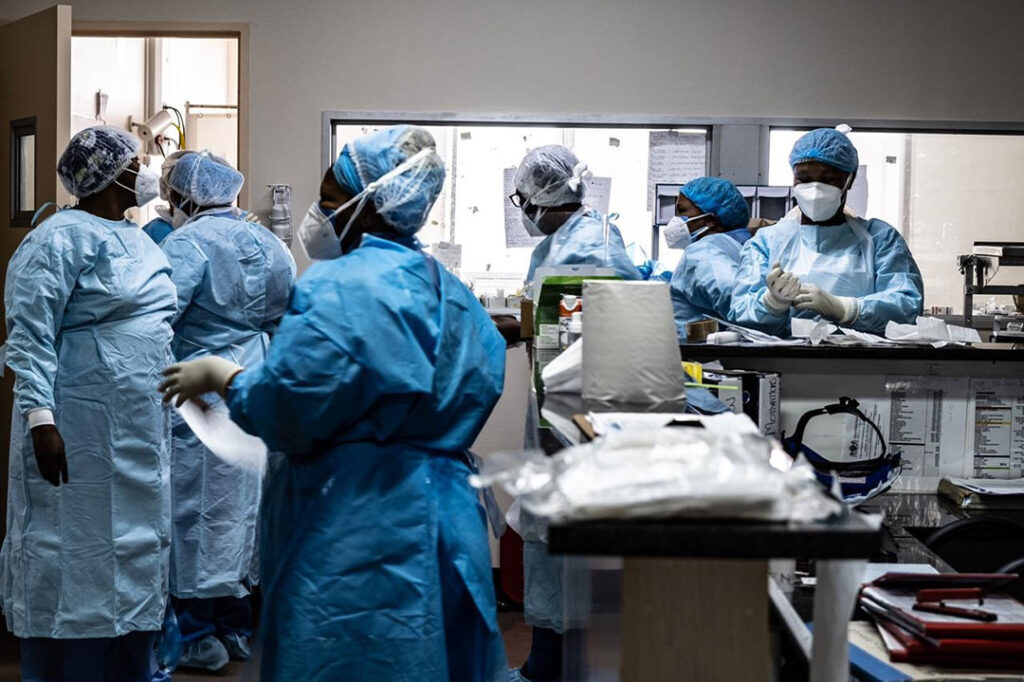ADF STAFF
Drawing on lessons learned from the COVID-19 pandemic, the African Union has approved a plan to boost the continent’s capacity for a forceful, unified and independent approach to future disease outbreaks.
During their summit in Addis Ababa, Ethiopia, continental leaders took a two-pronged approach to improving the continent’s response to future emergencies: They upgraded the Africa Centres for Disease Control and Prevention (Africa CDC) to an independent agency. They also approved creation of the African Pandemic Preparedness and Response Authority (APPRA) to coordinate and enforce efforts to control future pandemics.
“There will be another pandemic for sure; when I don’t know,” said Dr. John Nkengasong, director of the Africa CDC, during a press briefing. “We just better get ourselves organized so that we are not surprised.”
Under the plan approved by the AU, the Africa CDC will receive more autonomy to act without getting approval from AU officials. That new authority will be vested in Nkengasong, Africa CDC’s founding director, who will become director-general.
AU committees must work out plan details before it goes into effect, possibly as early as July.
The new status will give the Africa CDC the ability to respond to regional health emergencies in as few as two days. Under the current status, the approval process can take longer.
The APPRA will be created by treaty with the AU’s 55 member states. That treaty could take the rest of 2022 to negotiate and approve, Nkengasong said.
South African President Cyril Ramaphosa, who has spearheaded the AU’s COVID-19 response for two years, said the authority and associated relief fund would “secure the region’s capacity to respond to subsequent waves of COVID-19 and future pandemics.”
As a treaty, the APPRA framework will be binding on African nations regardless of their governments or politics, said Professor Olive Shisana, special advisor to Ramaphosa.
Shisana said the pandemic response authority will “ensure a very predictable and structured mechanism to stop and deploy medical countermeasures, financial resources, the workforce needed and predetermined strategies in the event of a health emergency of regional concern.”
“It’s a long-term thing,” she said at the press briefing. “It’s a visionary step that they’ve taken.”
The changes to Africa’s public health strategies build on other agencies, such as the African Medicines Supply Platform, which was created to respond to COVID-19. That agency and others depend on the generosity and cooperation of AU members rather than having the power of a treaty to back them up.
The APPRA will receive financial support from a pandemic response fund that will be an upgrade of the AU’s COVID-19 Response Fund, which raised $200 million to support the continent’s COVID-19 fight.
“I have absolutely no doubt that everyone who has seen the devastation that this virus has caused on the continent will not hesitate to contribute to such a fund — a fund that can be used in the future,” Nkengasong said.
Ramaphosa said the new system forms a coherent strategy for Africa that will help it protect its own citizens from future outbreaks rather than depending on aid from abroad.
“While the proposed global collaboration on pandemic preparedness was welcomed in principle, the COVID-19 pandemic exposed deep inequalities between wealthy and low- and middle-income countries that were not resolved through multilateralism,” Ramaphosa said.

